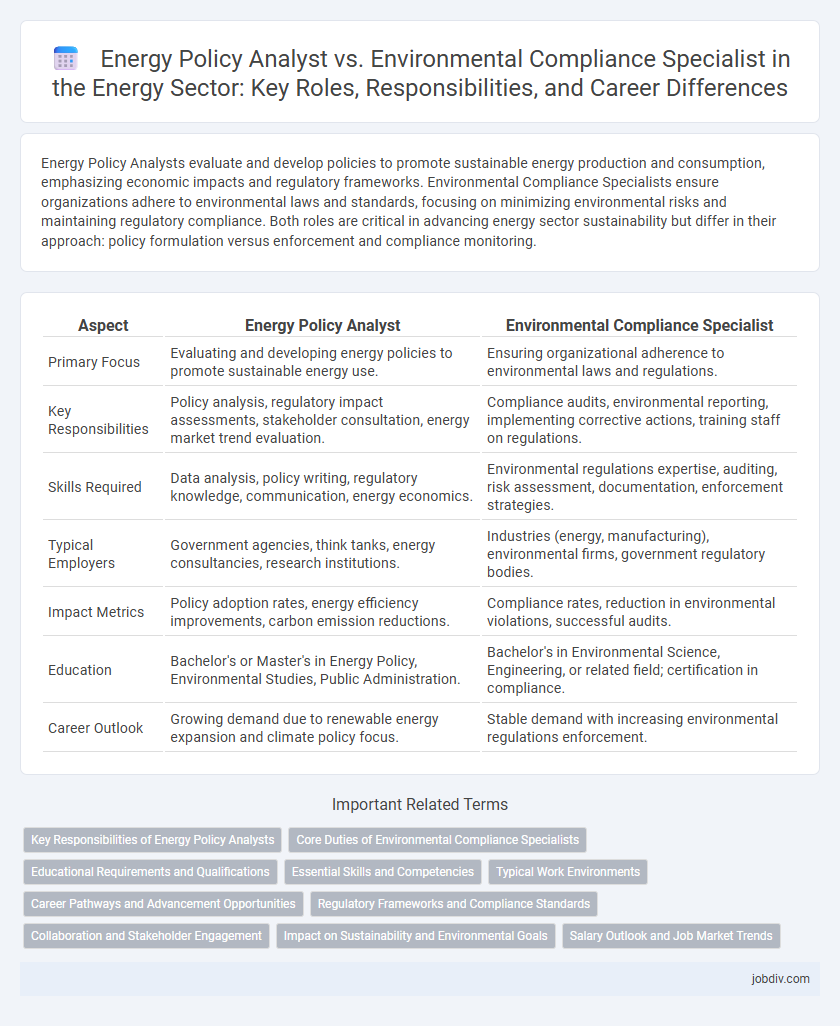Energy Policy Analysts evaluate and develop policies to promote sustainable energy production and consumption, emphasizing economic impacts and regulatory frameworks. Environmental Compliance Specialists ensure organizations adhere to environmental laws and standards, focusing on minimizing environmental risks and maintaining regulatory compliance. Both roles are critical in advancing energy sector sustainability but differ in their approach: policy formulation versus enforcement and compliance monitoring.
Table of Comparison
| Aspect | Energy Policy Analyst | Environmental Compliance Specialist |
|---|---|---|
| Primary Focus | Evaluating and developing energy policies to promote sustainable energy use. | Ensuring organizational adherence to environmental laws and regulations. |
| Key Responsibilities | Policy analysis, regulatory impact assessments, stakeholder consultation, energy market trend evaluation. | Compliance audits, environmental reporting, implementing corrective actions, training staff on regulations. |
| Skills Required | Data analysis, policy writing, regulatory knowledge, communication, energy economics. | Environmental regulations expertise, auditing, risk assessment, documentation, enforcement strategies. |
| Typical Employers | Government agencies, think tanks, energy consultancies, research institutions. | Industries (energy, manufacturing), environmental firms, government regulatory bodies. |
| Impact Metrics | Policy adoption rates, energy efficiency improvements, carbon emission reductions. | Compliance rates, reduction in environmental violations, successful audits. |
| Education | Bachelor's or Master's in Energy Policy, Environmental Studies, Public Administration. | Bachelor's in Environmental Science, Engineering, or related field; certification in compliance. |
| Career Outlook | Growing demand due to renewable energy expansion and climate policy focus. | Stable demand with increasing environmental regulations enforcement. |
Key Responsibilities of Energy Policy Analysts
Energy Policy Analysts conduct comprehensive research to evaluate the impact of energy regulations and develop strategic recommendations for sustainable energy use. They analyze data on energy production, consumption, and environmental effects to inform policy decisions supporting renewable energy integration and climate goals. These analysts frequently collaborate with government agencies, industry stakeholders, and environmental groups to shape energy legislation and ensure alignment with economic and environmental objectives.
Core Duties of Environmental Compliance Specialists
Environmental Compliance Specialists primarily ensure that organizations adhere to environmental laws and regulations by conducting inspections, monitoring pollution control measures, and preparing compliance reports. They collaborate with regulatory agencies to manage permits, address violations, and implement corrective actions to minimize environmental impact. Their role is critical in maintaining sustainable operations, reducing environmental risks, and supporting corporate sustainability initiatives within the energy sector.
Educational Requirements and Qualifications
Energy Policy Analysts typically hold a bachelor's or master's degree in energy policy, environmental science, economics, or public administration, with strong analytical and research skills. Environmental Compliance Specialists often require a degree in environmental science, engineering, or a related field, coupled with knowledge of regulatory frameworks and certifications like OSHA or NEBOSH. Both roles demand expertise in environmental regulations, but analysts emphasize policy evaluation, while compliance specialists focus on implementation and monitoring.
Essential Skills and Competencies
Energy Policy Analysts excel in data analysis, economic modeling, and regulatory research to develop sustainable energy strategies and assess policy impacts. Environmental Compliance Specialists specialize in risk assessment, environmental regulations, and monitoring protocols to ensure adherence to environmental laws and standards. Both roles require strong communication skills and proficiency in environmental management systems but differ in focus on policy formulation versus regulatory enforcement.
Typical Work Environments
Energy Policy Analysts typically operate in government agencies, research institutions, and think tanks where policy development and energy market analysis are central tasks. Environmental Compliance Specialists are often employed in industrial facilities, manufacturing plants, and environmental consulting firms, focusing on regulatory adherence and sustainability practices. Both roles require collaboration with regulatory bodies and stakeholders to ensure energy projects meet legal and environmental standards.
Career Pathways and Advancement Opportunities
Energy Policy Analysts typically advance by deepening expertise in regulatory frameworks and economic modeling, often progressing to senior advisory or government roles influencing national energy strategies. Environmental Compliance Specialists focus on mastering environmental laws and sustainability standards, with career pathways leading to managerial positions overseeing corporate compliance programs or consultancy roles in environmental risk management. Both professions offer growth through specialization, though Energy Policy Analysts emphasize strategic policy impact while Compliance Specialists center on operational enforcement and sustainability practices.
Regulatory Frameworks and Compliance Standards
Energy Policy Analysts evaluate and interpret regulatory frameworks to shape energy policies promoting sustainable and efficient resource use, emphasizing federal and state energy regulations such as the Clean Air Act and Renewable Energy Standards. Environmental Compliance Specialists focus on implementing and monitoring compliance with environmental laws and regulations, including EPA guidelines and ISO 14001 standards, ensuring organizational adherence to legal and environmental requirements. Both roles require in-depth knowledge of regulatory standards but differ as analysts influence policy development while specialists enforce and maintain compliance.
Collaboration and Stakeholder Engagement
Energy Policy Analysts drive collaboration by synthesizing complex data and regulatory frameworks to inform policymakers and engage diverse stakeholders, including government agencies, industry leaders, and community groups. Environmental Compliance Specialists facilitate stakeholder engagement through monitoring adherence to environmental regulations and communicating compliance requirements to businesses, ensuring transparent dialogue between regulators and affected parties. Both roles prioritize partnership-building to align energy initiatives with sustainable practices and regulatory mandates.
Impact on Sustainability and Environmental Goals
Energy Policy Analysts drive sustainability by developing regulations that promote renewable energy adoption and reduce carbon emissions, aligning with national and global environmental targets. Environmental Compliance Specialists ensure organizations adhere to environmental laws, preventing pollution and minimizing ecological footprints through effective monitoring and enforcement. Both roles are crucial for achieving sustainability, with analysts shaping policy frameworks and specialists implementing compliance strategies to meet environmental goals.
Salary Outlook and Job Market Trends
Energy Policy Analysts typically command higher salaries, with median annual wages around $75,000 to $90,000, reflecting demand in governmental and private sectors shaping sustainable energy regulations. Environmental Compliance Specialists earn slightly less, averaging $60,000 to $80,000, driven by enforcement of environmental laws and corporate adherence to sustainability standards. Job market trends indicate increased opportunities for both roles, fueled by growing emphasis on renewable energy policies and stricter environmental regulations worldwide.
Energy Policy Analyst vs Environmental Compliance Specialist Infographic

 jobdiv.com
jobdiv.com